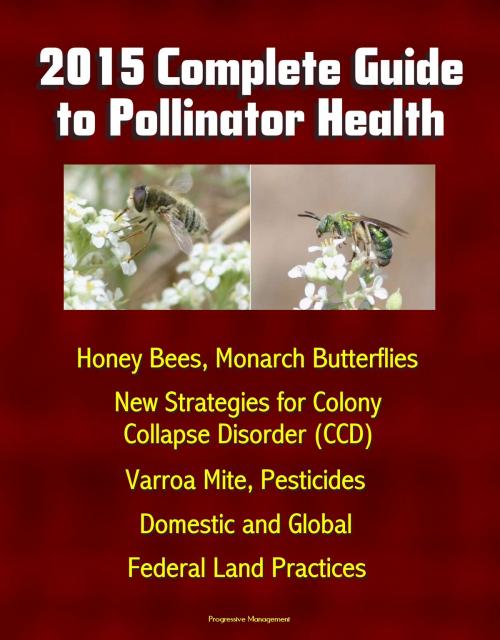2015 Complete Guide to Pollinator Health: Honey Bees, Monarch Butterflies, New Strategies for Colony Collapse Disorder (CCD), Varroa Mite, Pesticides, Domestic and Global, Federal Land Practices
Nonfiction, Science & Nature, Science, Biological Sciences, Entomology, Technology, Agriculture & Animal Husbandry| Author: | Progressive Management | ISBN: | 9781310775024 |
| Publisher: | Progressive Management | Publication: | May 23, 2015 |
| Imprint: | Smashwords Edition | Language: | English |
| Author: | Progressive Management |
| ISBN: | 9781310775024 |
| Publisher: | Progressive Management |
| Publication: | May 23, 2015 |
| Imprint: | Smashwords Edition |
| Language: | English |
This comprehensive compilation of official government documents, updated in 2015, provides complete coverage of the threat to pollinator health and the actions of the federal government to address the problem - including the new 2015 Pollinator Health Task Force Report - National Strategy to Promote the Health of Honey Bees and Other Pollinators, Pollinator Research Action Plan, and the Pollinator-Friendly Best Management Practices for Federal Lands document. In addition, earlier reports and annual updates deal with the suspected causes of the devastating problem, and trace the history of CCD to it origin.
Pollinators are critical to the Nation’s economy, food security, and environmental health. Honey bee pollination alone adds more than $15 billion in value to agricultural crops each year, and helps ensure that our diets include ample fruits, nuts, and vegetables. This tremendously valuable service is provided to society by honey bees, native bees and other insect pollinators, birds, and bats. But pollinators are struggling. Last year, beekeepers reported losing about 40% of honey bee colonies, threatening the viability of their livelihoods and the essential pollination services their bees provide to agriculture. Monarch butterflies, too, are in jeopardy. The number of overwintering Monarchs in Mexico’s forests has declined by 90% or more over the past two decades, placing the iconic annual North American Monarch migration at risk. That’s why last June, President Obama issued a Presidential Memorandum directing an interagency Task Force to create a Strategy to Promote the Health of Honey Bees and Other Pollinators. Today, under the leadership of the U.S. Environmental Protection Agency (EPA) and U.S. Department of Agriculture (USDA), the Task Force is releasing its Strategy, with three overarching goals: Reduce honey bee colony losses to economically sustainable levels; increase monarch butterfly numbers to protect the annual migration; and restore or enhance millions of acres of land for pollinators through combined public and private action. The Strategy and its accompanying science-based Pollinator Research Action Plan outline needs and priority actions to better understand pollinator losses and improve pollinator health. These actions will be supported by coordination of existing Federal research efforts and accompanied by a request to Congress for additional resources to respond to the pollinator losses that are being experienced. Increasing the quantity and quality of habitat for pollinators is a major part of this effort—with actions ranging from the construction of pollinator gardens at Federal buildings to the restoration of millions of acres of Federally managed lands and similar actions on private lands. To support these habitat-focused efforts, USDA and the Department of Interior are today issuing a set of Pollinator-Friendly Best Management Practices for Federal Lands, providing practical guidance for planners and managers with land stewardship responsibilities.
Wherever flowering plants flourish, pollinating bees, birds, butterflies, bats, and other animals are hard at work, providing vital but often unnoticed services. But many pollinators are in serious decline in the United States and worldwide. Preventing continued losses of our country's pollinators requires immediate national attention, as pollinators play a critical role in maintaining diverse ecosystems and in supporting agricultural production. Some three-fourths of all native plants in the world require pollination by an animal, most often an insect, and most often a native bee. Pollinators, most often honey bees, are also responsible for one in every three bites of food we take, and increase our nation's crop values each year by more than 15 billion dollars.
This comprehensive compilation of official government documents, updated in 2015, provides complete coverage of the threat to pollinator health and the actions of the federal government to address the problem - including the new 2015 Pollinator Health Task Force Report - National Strategy to Promote the Health of Honey Bees and Other Pollinators, Pollinator Research Action Plan, and the Pollinator-Friendly Best Management Practices for Federal Lands document. In addition, earlier reports and annual updates deal with the suspected causes of the devastating problem, and trace the history of CCD to it origin.
Pollinators are critical to the Nation’s economy, food security, and environmental health. Honey bee pollination alone adds more than $15 billion in value to agricultural crops each year, and helps ensure that our diets include ample fruits, nuts, and vegetables. This tremendously valuable service is provided to society by honey bees, native bees and other insect pollinators, birds, and bats. But pollinators are struggling. Last year, beekeepers reported losing about 40% of honey bee colonies, threatening the viability of their livelihoods and the essential pollination services their bees provide to agriculture. Monarch butterflies, too, are in jeopardy. The number of overwintering Monarchs in Mexico’s forests has declined by 90% or more over the past two decades, placing the iconic annual North American Monarch migration at risk. That’s why last June, President Obama issued a Presidential Memorandum directing an interagency Task Force to create a Strategy to Promote the Health of Honey Bees and Other Pollinators. Today, under the leadership of the U.S. Environmental Protection Agency (EPA) and U.S. Department of Agriculture (USDA), the Task Force is releasing its Strategy, with three overarching goals: Reduce honey bee colony losses to economically sustainable levels; increase monarch butterfly numbers to protect the annual migration; and restore or enhance millions of acres of land for pollinators through combined public and private action. The Strategy and its accompanying science-based Pollinator Research Action Plan outline needs and priority actions to better understand pollinator losses and improve pollinator health. These actions will be supported by coordination of existing Federal research efforts and accompanied by a request to Congress for additional resources to respond to the pollinator losses that are being experienced. Increasing the quantity and quality of habitat for pollinators is a major part of this effort—with actions ranging from the construction of pollinator gardens at Federal buildings to the restoration of millions of acres of Federally managed lands and similar actions on private lands. To support these habitat-focused efforts, USDA and the Department of Interior are today issuing a set of Pollinator-Friendly Best Management Practices for Federal Lands, providing practical guidance for planners and managers with land stewardship responsibilities.
Wherever flowering plants flourish, pollinating bees, birds, butterflies, bats, and other animals are hard at work, providing vital but often unnoticed services. But many pollinators are in serious decline in the United States and worldwide. Preventing continued losses of our country's pollinators requires immediate national attention, as pollinators play a critical role in maintaining diverse ecosystems and in supporting agricultural production. Some three-fourths of all native plants in the world require pollination by an animal, most often an insect, and most often a native bee. Pollinators, most often honey bees, are also responsible for one in every three bites of food we take, and increase our nation's crop values each year by more than 15 billion dollars.















